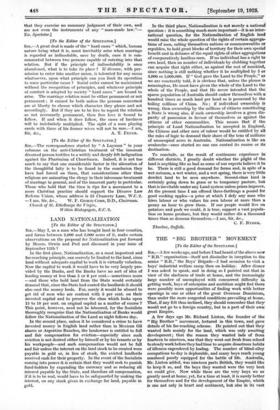LAND NATIONALIZATION
[To the Editor of the SPECTATOR.] SIR,—May I, as a man who has bought land in four counties, and farms between 2,000 and 3,000 acres of it, make certain observations on the proposal for Nationalization put forward by Messrs. Orwin and Peel and discussed in your issue of September 12th ?
In the first place, Nationalization, as a most important and far-reaching principle, can scarcely be limited to the land, since land without adequate capital to work it is virtually valueless. Now the capital to work it would have to be very largely pro- vided by the Banks, and the Banks have no sort of idea of lending money at less than 5 or 6 per cent.—sometimes more —and those who hold land from the State would certainly demand that, since the State had ousted the landlords it should also oust the money lords. For, surely it would be absurd to get 'rid of men who are content with 3 per cent. on their invested capital and to preserve the class which looks upon 15 to 18 per cent. on original capital as a matter of course ? This point, however, need not be laboured, for the Socialists thoroughly recognize that the Nationalization of Banks would follow the Nationalization of the Land as night follows day.
In the second place, unless it be considered a crime to have invested money in English land rather than in Mexican Oil shares or Argentine Ranches, the landowner is entitled to full and fair compensation for eviction—especially since such eviction is not desired either by himself or by his tenants or by his workpeople—and such compensation would not be full and fair unless the interest on the land stock to be created were payable in gold or, in lieu of stock, the evicted landlords received cash for their property. In the event of the Socialists coming into power it is certain that they would seek to punish fund-holders by expanding the currency and so reducing all interest payable by the State, and therefore all compensation, if it is to be real, would have to be safeguarded by making the interest, on any stock given in exchange for land, payable in gold.
In the third place, Nationalization is not merely a national question : it is something much more important—it is an inter- national question, for the Nationalization of English land would raise 'the whole question of the rights of certain aggregaa Cons of men, calling themselves nations or commonwealths or republics, to hold great blocks of territory for their own special benefit and in defiance of the equal rights of other aggregations of comparatively landless men. If no individual has a right to' own land, then no number of individuals by clubbing together can acquire that right either, as against the rest of mankind, since nothing is still nothing whether it be multiplied by 5 or 5,000 or 5,000,000. If " God gave the Land to the People," as we are constantly told, it is obvious that, unless the phrase is meaningless, He must have given the whole of the Land to the' whole of the People, and that He never intended that the sparse population of Australia should endow themselves with a' hundred times as much land per head as is possessed by the toiling millions of China. No ; if individual ownership is wrong, then ownership by the millions of citizens constituting a State is wrong also, if such ownership involves a gross dis parity of possession in favour of themselves as against the citizens of other communities. This means that if the principle of Land Nationalization be accepted in England,' the Chinese and other men of colour would be entitled by all the rules of logic to demand their share of the tens of millions' of unoccupied acres in Australia. Nationalization is like an avalanche—once started no one can control its course or its destination.
To conclude, as the result of continuous experience different districts, I greatly doubt whether the plight of the land is anything like so bad as some of our experts believe it to be. There is still a good demand for farms and, in spite of a wet autumn, a wet winter, and a wet spring, there is very little derelict land to be seen anywhere. Second-class land is certainly going down to grass or to temporary pasture, but that is inevitable under any Land system unless prices improve. At the present time I am offered three-farthings a pound for, good cooking apples—a price at which I defy any man who hires labour or who values his own labour at more than a penny an hour to grow them. If our people would live on potatoes and pork we could, it is true, support a vast popula- tion on home produce, but they would rather die a thousand times than so demean themselves.—I am, Sir, &c., - Thurlow, Suffolk. C. F. RYDER.










































 Previous page
Previous page